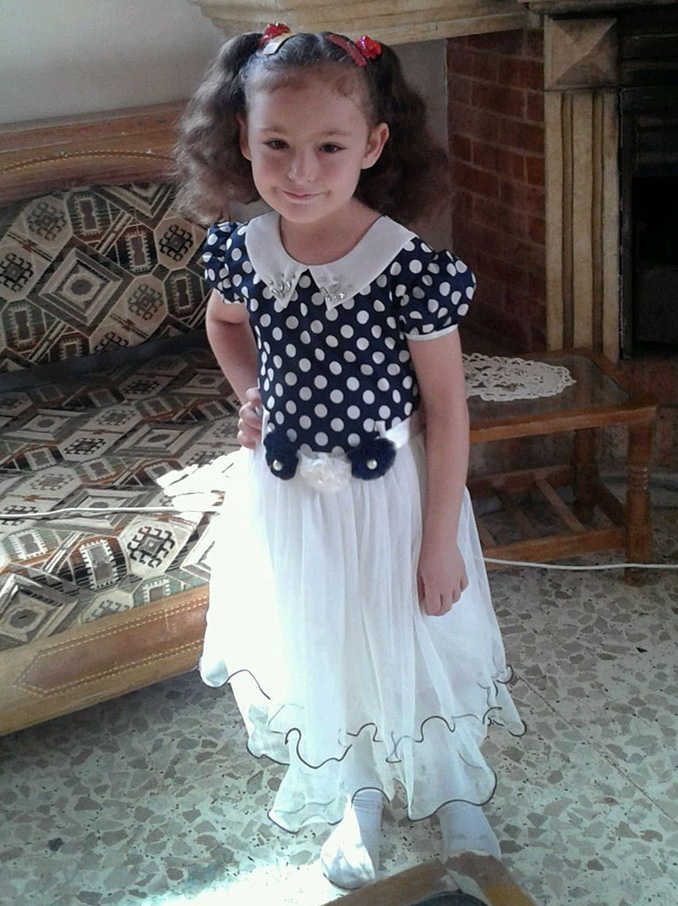KADIRLI, Turkey — The 4-year-old Syrian girl was ending her first trip to her grandparents’ house. Posing for the last family photos before returning to Turkey with her mother, Raghad dressed up in a pretty blue-and-white polka dot dress and put her hair up in ponytails with red barrettes.
About an hour later, the family heard Russian warplanes overhead and the missiles struck. Raghad, her grandfather and another relative were killed.
The girl is among dozens of civilians who activists say have been killed in the Russian air campaign in Syria, which Moscow says is aimed at crushing the Islamic State group and other Islamic militants.
But the month-old Russian bombardment has killed more civilians than it has IS militants, according to the main activist group tracking the conflict, the Syrian Observatory for Human Rights. Despite Russian boasts to be going after the extremists more ferociously than Americans have, the Observatory’s figures suggest the air campaign waged by a U.S.-led coalition has killed IS members at a higher rate while harming civilians less.
The Observatory said it has so far confirmed 185 civilians killed in Russian strikes the past month — including 46 women and 48 children — while the toll among IS fighters was 131. The heaviest toll came among Syrian rebels not connected to IS, with 279 dead, the group said. In contrast, the U.S.-led air campaign has killed 3,726 IS members — an average of 252 a month, and 225 civilians — according to the Observatory’s statistics.
The Russians have flatly dismissed all claims of civilian casualties or damage, saying they use various intelligence sources to plan each strike to make sure there is no collateral damage.
Activists say most Russian strikes have targeted Syrian rebels not connected to IS, including U.S.-backed factions, with the aim of tipping the civil war in favor of Moscow’s ally, President Bashar Assad. For example, Raghad’s grandfather, Col. Abdul-Razzaq Khanfoura, was a defector from the Syrian military who until recently was a senior commander in the Western-backed Free Syrian Army, though it is not known if he was the target of the Oct. 1 airstrike in the village of Habeet in the rebel-held province of Idlib.
When the Khanfoura family heard the Russian warplanes overhead, Abdul-Razzaq’s wife Zahra scooped up her granddaughter Raghad and rushed to a shelter in the house’s garden. Just as she handed the girl to a cousin in the shelter, the missiles hit the house.
“The explosion was above me,” the 48-year-old Zahra told The Associated Press as she lay in a hospital bed in this southern Turkish city, where she is being treated for the extensive burns from the blast. “After that I have no idea what happened.”
In the strike that hit the Khanfoura family home, the Observatory reported the attack in Habeet at the time, saying three people were killed. The next day, the Russian Defense Ministry put out a statement of targets over the past 24 hours that included Habeet, saying it struck “a facility used by the rebels as a temporary base and ammunition depot.”
Russia has pushed back hard against reports of civilian deaths. On Tuesday, it released satellite pictures it said refuted the claims of damage to civilian areas.
Human Rights Watch last week said at least two airstrikes on Oct. 15 that killed a total of 59 civilians, including 33 children, “apparently violated the laws of war.” It said the strikes were apparently by Russian warplanes: One hit a house in the village Ghantou and killing members of the extended family of an FSA commander, including women and children, and the other struck near a bakery in the neighboring town of Ter Maaleh, killing an FSA commander and 13 civilians.
In Habeet, Raghad and her mother had come to visit from Turkey, where they have lived since late 2011, soon after Raghad’s birth. It was the young girl’s first trip back into Syria. Her grandfather, Abdul-Razzaq, defected from the military in 2012 and founded the Ahbab al-Mustafa Brigade, one of the early factions that made up the Free Syrian Army. But earlier this year, he stopped rebel activities to stay at home.
In the chaos after the nighttime bombing, Abdul-Razzaq’s son Ward ran to the top floor and found his father, bleeding from a shrapnel wound in his stomach. Ward recounted to the AP that he carried his father to a car that rushed him to a nearby clinic. Abdul-Razzaq died two hours later.
Ward then made his way to the shelter in the garden, which he found buried under debris. He dug frantically and found Raghad, face down. She was dead, with severe damage to her skull. A nephew of Abdul-Razzaq, 19-year-old Ahmed Khanfoura, lay dead beneath her.
Raghad’s mother was in another part of the house when the missile struck and survived unharmed.
Ward heard his mother Zahra screaming in pain. She was caught under a fence that fell on her. “I recited the Shahada and surrendered to God,” she said later, referring to Islam’s profession of faith, “There is no God but God and Muhammad is his messenger,” which Muslims pronounce when they fear they are about to die
Ward got her to a clinic, and the next day she was taken across the border into Turkey and to a specialized burn hospital in Kadirli.
Four weeks later, Zahra still doesn’t know that her husband and granddaughter are dead. Every time Ward visits her, she asks why Abdul-Razzaq hasn’t called or come to see her. Ward tells her his father hasn’t been able to cross to Turkey and the phones aren’t working,
When she asks him to send him a message saying hello, Ward acts as if he’s writing a message on his smart phone and tells her he sent it.
____
Associated Press writers Vladimir Isachenkov in Moscow and Lolita C. Baldor in Washington contributed to this report.
____
Follow Bassem Mroue at http://twitter.com/bmroue

